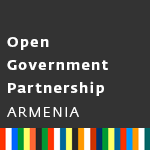OGP-Armenia Executive
About OGP
The OGP is a voluntary, multi-stakeholder international initiative that aims to secure concrete commitments from governments to their citizenry to promote transparency, empower citizens, fight corruption, and harness new technologies to strengthen governance. The OGP’s central mission is to drive open government reform and innovation at the country level, and to stretch countries beyond their current baseline in the areas of transparency, accountability, and citizen engagement.
It takes political leadership. It takes technical knowledge. It takes sustained effort and investment. It takes collaboration between governments and civil society.
The Open Government Partnership is a new multilateral initiative that aims to secure concrete commitments from governments to promote transparency, empower citizens, fight corruption, and harness new technologies to strengthen governance. In the spirit of multi-stakeholder collaboration, OGP is overseen by a steering committee of governments and civil society organizations.
To become a member of OGP, participating countries must embrace a high-level Open Government Declaration; deliver a country action plan developed with public consultation; and commit to independent reporting on their progress going forward.
The Open Government Partnership formally launched on September 20, 2011, when the 8 founding governments (Brazil, Indonesia, Mexico, Norway, Philippines, South Africa, United Kingdom, United States) endorsed an Open Government Declaration, and announced their country action plans. Since September, OGP has welcomed the commitment of 47 additional governments to join the Partnership.
- Meet the minimum eligibility criteria in four key areas: fiscal and budget transparency, access to information, asset disclosure for public and elected officials, and basic protections for civil liberties/citizen engagement;
- Signal the government's intent to participate in the OGP by sending a letter of commitment to open government and intent to participate in the OGP to the OGP Steering Committee for posting on the OGP portal;
- Undertake broad public consultation to inform the government's OGP commitments, and identify a multi-stakeholder forum for regular public consultation on OGP implementation;
- Develop an OGP country plan with concrete commitments reflecting the four core open government principles of transparency, citizen participation, accountability, and technology and innovation; and including active engagement of citizens, civil society, and peer consultation with participants and the Steering Committee;
- Publicly endorse the OGP Declaration of Principles and deposit the final country action plan on the OGP portal.
- Publish a self-assessment report on progress after 12 months of OGP implementation, and cooperate with the Independent Reporting Mechanism in generating its own report.
- Contribute to the advancement of open government in other countries by sharing best practices, expertise, technical assistance, technologies, and resources, as appropriate.
